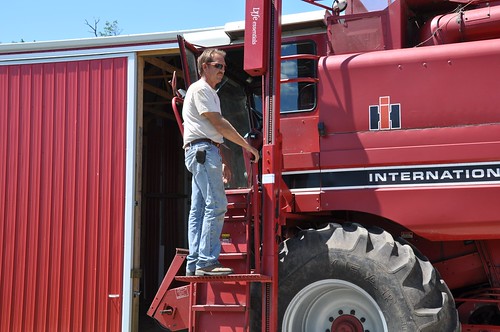
Farmers, ranchers, and other agricultural workers have one of the most dangerous occupations in America, suffering more fatal work injuries each year than most other professions. There were 570 fatalities in 2015 and even more debilitating injuries.
Agricultural workers with disabilities are often unable to continue working in a manner they are accustomed to, resulting in reduced productivity and increased chance of secondary injury. But with the help of AgrAbility, many of these professionals are able to put their knowledge and expertise back into the field.
The AgrAbility program at USDA’s National Institute of Food and Agriculture (NIFA) enhances the quality of life for agricultural workers with disabilities by funding educational programs that advance their knowledge of farm safety, educate health professionals, and adapt new technologies for farmers with disabilities.
State/Regional AgrAbility Projects (SRAPs) are projects in which state cooperative extension services at land-grant institutions and non-profit organizations work together at the state and regional levels to meet the needs of agricultural workers with disabilities. NIFA currently supports 20 SRAPs.
The National AgrAbility Project (The National AgrAbility Project (NAP), hosted by Purdue University, supports the SRAPs as they develop and deliver core services to AgrAbility customers. NAP also helps enhance outreach to underserved populations, migrant and seasonal farm workers, and veterans. Further, NAP organizes annual AgrAbility national training workshops and develops program-related publications and free online training to farmers and ranchers with disabilities and those who work with them.
NIFA has awarded nearly $55 million in AgrAbility grants to 35 states since 1991, resulting in direct on-farm assistance to more than 11,900 farmers and indirect to thousands more. Program recipients report significantly greater quality of life, independent living, and working than do ag workers who have not been served by SRAPs.
Farmer Ed Bell is an example of AgrAbility’s benefits at the personal and community level. The program has “shown me that… I’m an average farmer; I just happen to have a disability. I can still work and support my family in agriculture,” he said. Ed grows strawberries and asparagus on 71 acres in Indiana and employs a minimum of eight people per year to assist him on the farm. “My disability,” Ed notes, “has not been a harsh economic burden to my community.”
Each SRAP receives $180,000 per year in funding and their efforts provide substantial, sustained return on NIFA’s investment in farm safety. For example, in 2016-2017, Missouri’s AgrAbility Project:
- Provided onsite farmstead assessment and farm management planning assistance to 66 farmers with disabilities;
- Trained 75 farmers and their spouses about medication-related agricultural injury risks, 37 occupational and physical therapists on safely accommodating AgrAbility clients, and 70 pharmacists on how to serve as partners in agricultural health and safety; and
- Partner organizations provided assistive technology or devices valued at more than $689,872.
Similarly, Nebraska’s AgrAbility Project contacted more than 80 agribusiness firms over the past year to identify assistive technology solutions that could meet the needs of 55 Nebraska farmers and ranchers with disabilities, resulting in $655,718 in assistive technology for their clients.
NIFA invests in and advances agricultural research, education, and extension and seeks to make transformative discoveries that solve societal challenges.

